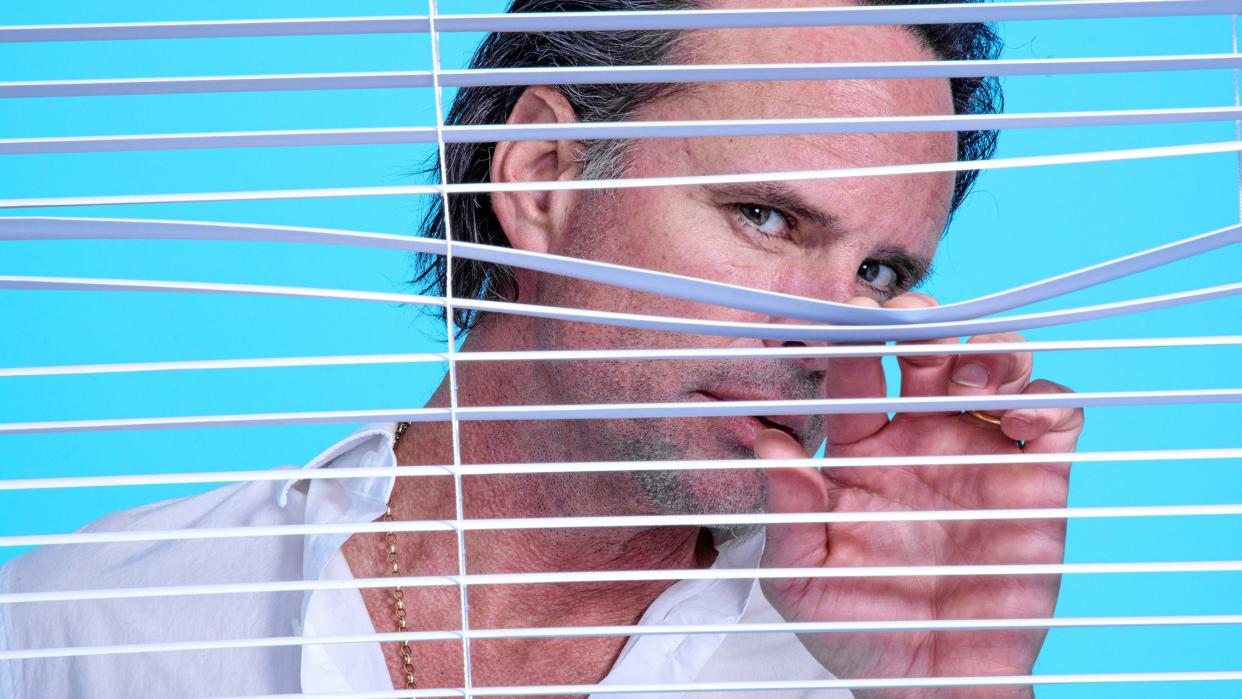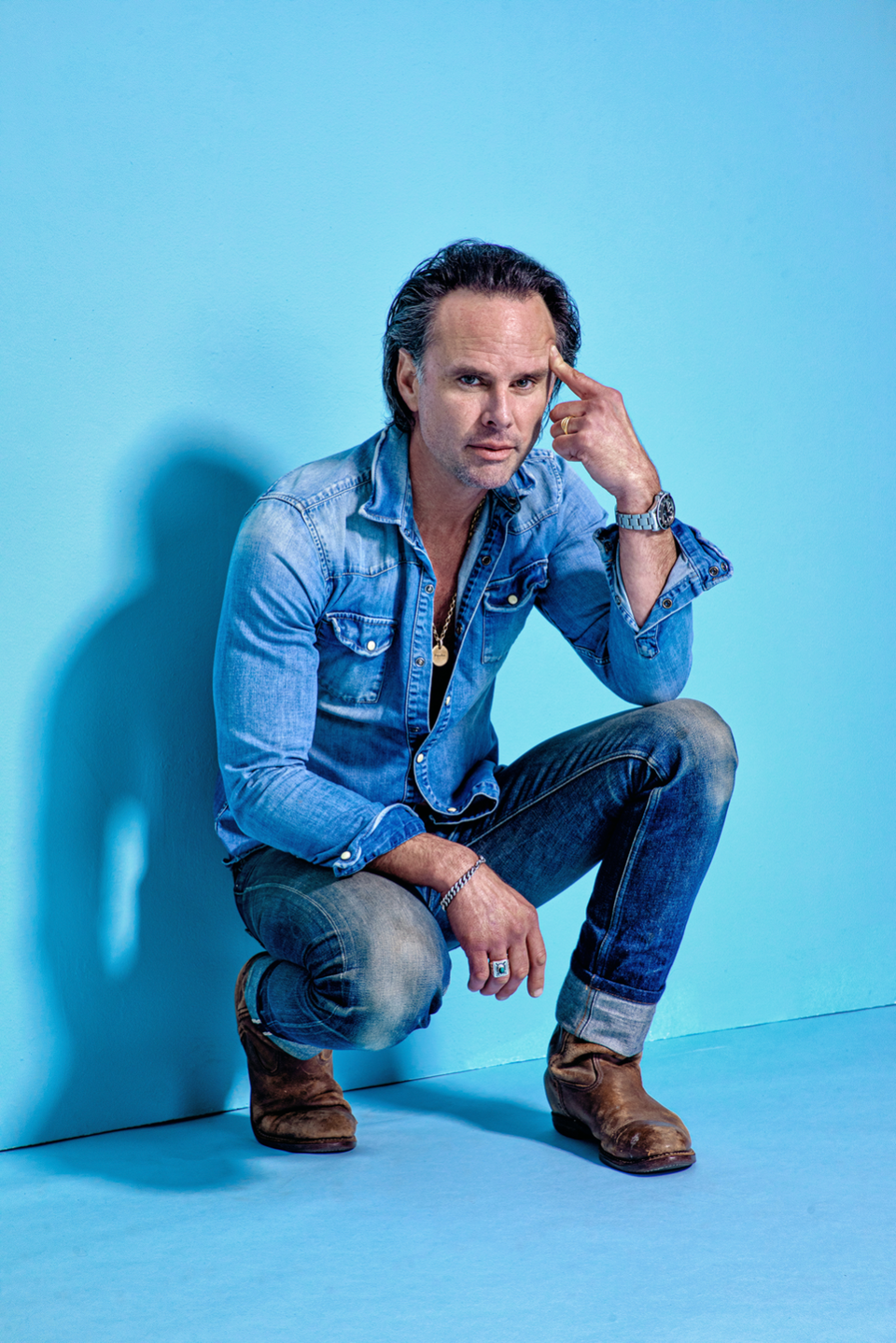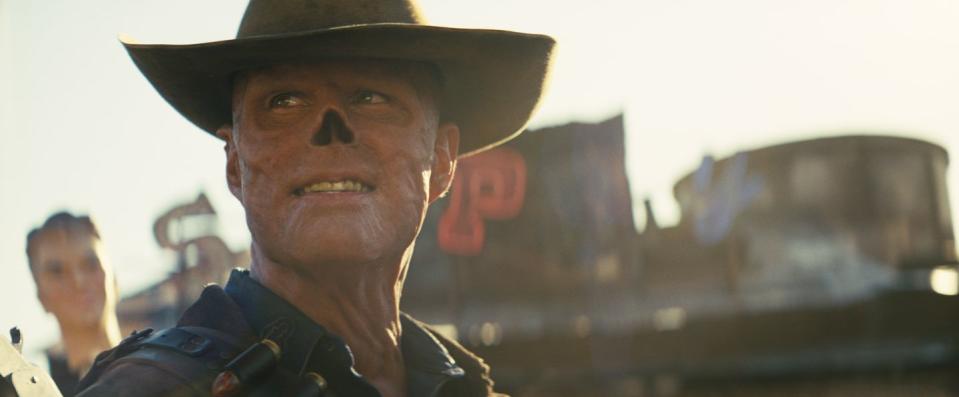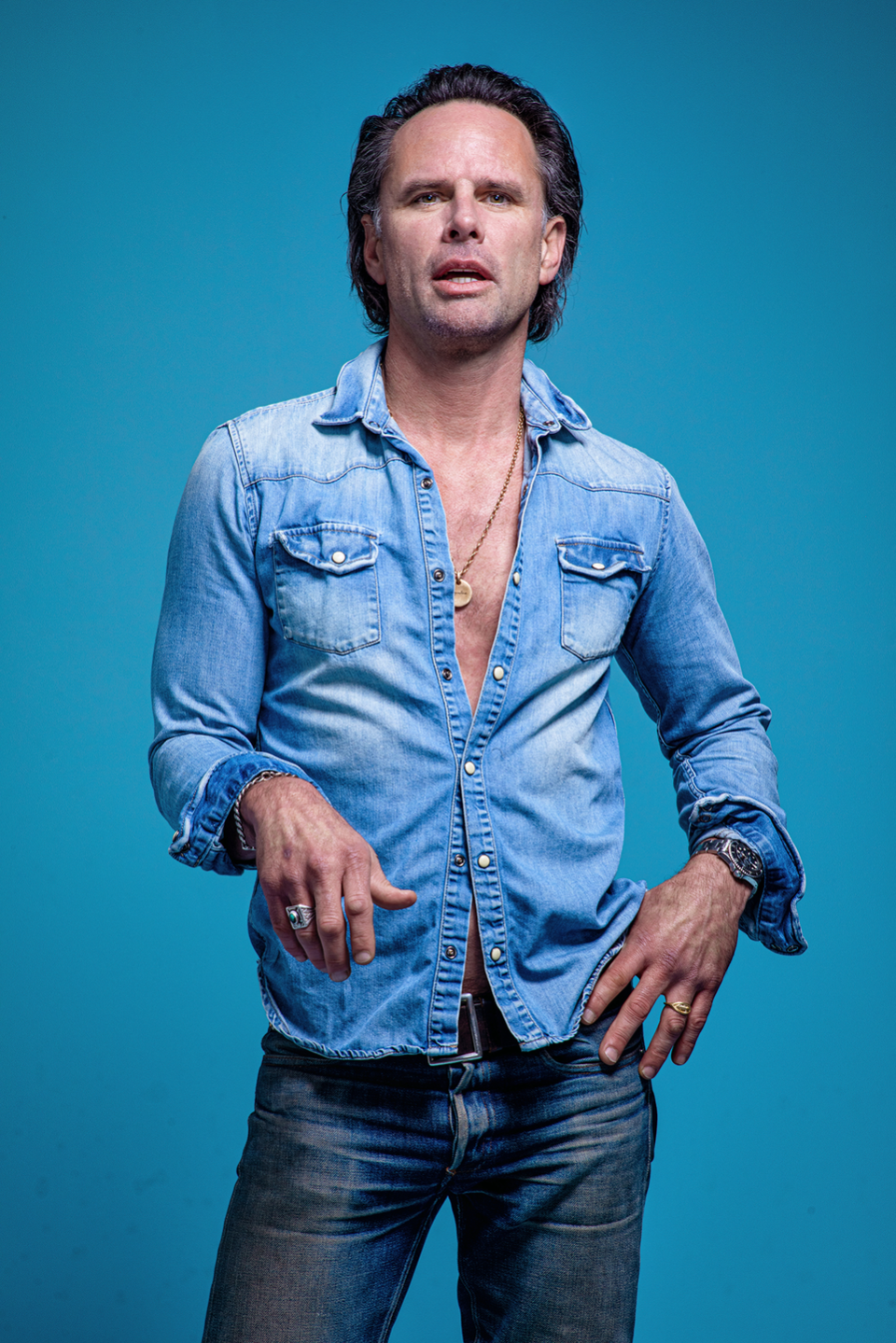Walton Goggins Is Gunslinging His Way Through TV

- Oops!Something went wrong.Please try again later.
- Oops!Something went wrong.Please try again later.
- Oops!Something went wrong.Please try again later.
- Oops!Something went wrong.Please try again later.
This article was originally featured in MH Flex, our monthly newsletter recommending the one in-depth interview you need to flex your pop culture knowledge. Sign up here to get it first.
THE SUN HADN’T even risen and Walton Goggins was getting ready to leave for his very first screen test on the set of Fallout, Prime Video’s series adaptation of the mega-hit post-apocalyptic video game. His character, the Ghoul, is a cowboy who’s survived 200 years of poisoned nuclear air. His skin has the texture of melting wax, and he doesn’t have a nose. If Sergio Leone directed The Hills Have Eyes, the Ghoul would have been its star. The behind-the-scenes transformation—made up almost entirely of practical effects—would take hours. Goggins had just flown into Los Angeles from New York City the night before. Still groggy, he lumbered out of bed, put on some pants, and started a pot of coffee when he suddenly felt a stinging sensation all up and down his legs.
“I was like, What the fuck? Oh my God. Oh my God. Oh my God,” he says. “And it kept stinging over and over again. I pulled my pants down, and there was a big spider.”
Now, reading a Walton Goggins story does not do justice to the experience of hearing Walton Goggins tell a story. If you’ve ever seen him on screen—and you surely have, whether it was in six seasons of Justified, his two films with Quentin Tarantino, one of several HBO comedies created by Danny McBride, or his myriad other credits—you know that this man can sell a story.
“Right here, man,” he says, gesturing with both hands toward his jeans at the closest possible point to his crotch that could legally and physiologically be considered not his crotch. “Inches away from the danger zone. And I was aware enough to put it in a little plastic bag.”

But it wasn’t until a friend urged him to go to the emergency room as soon as possible that he decided to make a pit stop at the local hospital on the way to the set. It turns out he’d been bitten five times by a poisonous brown recluse spider. “I said, ‘Well, I’ve got to go get this makeup done, so just give me whatever shots I need, then I’ve got to go!’” he recalls. “And so the very first test was done under that stress, but it worked out.” For some people, a spider going to town in your trousers would be the end of their day; for Goggins, it was the beginning, just another story to tell in the makeup chair.
Goggins, who at 52 years old has earned his place as one of our very finest character actors, is an actor, yes. But it’s clear from just from a couple hours in his presence that he’s a performer. Alabama-born and Georgia-raised, he’s got good old Southern charm at his side like a holster. After 30-plus years onscreen, he knows seemingly everyone in the business. He’s thoughtful with his answers but quick with a joke. He makes you laugh, and he laughs easily, too.
Dressed in cool jeans and a shirt with the buttons undone nearly down to his belt, his hair slicked back, he sat down with Men’s Health to talk about his transformation into the Ghoul for Fallout, his collaborations with people like Danny McBride and Quentin Tarantino, and whether there could be another chapter of Justified.
MEN’S HEALTH: You’ve been in the game for a while, and you’re a very physical performer, no matter the role or genre. What’s your approach to fitness and wellness these days?
WALTON GOGGINS: Fitness has been a part of my life for 32 years, since doing The Next Karate Kid when I was 21 years old. The training that [stunt coordinator] Pat Johnson—who was Steve McQueen’s stunt double—put us through, it just radically changed my life. It really changed my relationship with my body and with my mind, and it’s been with me ever since.
And since leaving Los Angeles and moving to the middle of the woods—we live on 125 acres—running has become a big part of my life, too. I like running in the cold as much as I like running in the hot. And I couple that with weight training. I recently got a new machine from Matrix Fitness for my home gym. I’ve been acting for 30 years, and I’ve probably been on the road for 18 or 19 of those 30 years. So I know hotel gyms, that’s what I’m comfortable with, and this was a machine I’ve worked out on many times. It was very comforting to me, really.
That’s the one consistency on the road, for me: I have a bar and I have a gym. And those two things are integral to my process as a storyteller.

MH: So you see physical fitness as part of the mental process of preparing for a role.
WG: Look, I like to drink and I like to party. And I like to work out and I like to meditate. I think: everything in moderation, including moderation. And part of that is getting my mind right without thinking about anything except lifting a heavy weight or a light weight. It focuses me, in a way, and it calms me down. It’s a recipe for longevity.
MH: Your new show, Fallout, is based on a popular video-game franchise. In the past, video-game adaptations have had a so-so reputation. This isn’t your first; you were in the 2018 Tomb Raider movie, too. Do you think the prospects for these adaptations have changed over time?
WG: When I got offered Tomb Raider and read it for the first time, I thought, This is a story about a young woman who is looking for her father. I didn’t carry the weight of a franchise or an intellectual property. I didn’t put it in a box of: This is a video-game adaptation, therefore it has to look like this or feel like this or succeed in this way.
Just take it out of that conversation and put it into the context of story: What is the story? What are you really saying with it? What is really happening in any given moment?
It was the same with Fallout. I don’t want to shoulder the burden of adapting a successful game franchise. Instead, I ask: The world exists in the fallout of a nuclear war, so what happens on the other side of that? What happens to the privileged few among us who got to ride it out in underground bunkers? And what happens to the rest of us who were forced to suffer on the surface?
MH: Did you do a deep dive into the Fallout games before diving in?
WG: The answer is no. I’d heard of Fallout. My son is 13 years old, and he’s a big Bethesda player—Elder Scrolls is his game. But once this opportunity came, I decided not to play it and not to read anything about it, to be quite honest with you. I thought that there needed to be some person in the room that was keeping everybody else honest. I knew [Bethesda Game Studios executive producer Todd Howard] and the people on the set from Bethesda would keep us honest about the game.
And it’s not a one-to-one interpretation of the game, right? It’s a world that kind of exists within the game, but it’s its own thing within the Fallout universe. It’s not like Fallout 4 or Fallout 5—it’s its own thing.
MH: The Last of Us was a hugely successful adaptation in every way—Pedro Pascal and Bella Ramsey’s performances, the world-building, the writing. Do you think its success may have ushered in a cultural shift where people are better prepared for shows like Fallout?
WG: Certainly. It was a great adaptation. Pedro’s a good friend of mine—I watched every episode. But the success of The Last of Us comes down to the writing and the actors and the storytelling. All of these adaptations are standing on the shoulders of the video-game adaptation that came before them. They’ve all been beachheads, in a way. If we’re benefiting today, it’s due in large part to the hard work of all these filmmakers and actors who reinvented the genre. And then you reinvent it again and you learn something new. And that’s what we have with Fallout.
MH: Pedro’s star was already rapidly on the rise, but The Last of Us seemed to open him to an even wider audience. He’s continued to blow up since then. Did you ever talk to him about the experience of shooting a project with that kind of rabid fan base?
WG: Pedro and I never compared notes or talked about his experience other than for me to tell him how blown away I was by what he did. And yeah, he has blown up—but that didn’t happen overnight. He’s been doing it a very long time, and he’s been doing it at a high level for a very long time. And he deserves this moment and every moment that comes after.
MH: You didn’t play the Fallout games. So what was it that drew you to the show?
WG: First and foremost, getting the opportunity to work with Jonathan Nolan. I’ve been a fan of his for such a long time, going back to Memento [which he cowrote with his brother, Christopher Nolan]. I went home and wrote a bunch of clues on my arms after I watched that film. I’ve just been a fan of everything he does; he’s one of the smartest people I’ve ever met.
MH: Your character on the show, the Ghoul, looks the part. You have no nose and a lot of facial prosthetics. Walk me through that makeup process.
WG: First, most importantly—and [Nolan] was a big proponent of this—we all wanted the audience to lean in, look at him, and not be repulsed by him. For a man who’s been irradiated for 200 years, we wanted people to find him in some ways hot and attractive—if that’s even possible.
The very first time we put on [the prosthetics], it took five hours to get it all set up, and I was crawling out of my skin. I thought, I don’t know how the fuck I’m going to do this! The second time, we got it down to three hours. And by the end of the experience, we got it down to one hour and 50 minutes—just long enough to watch a movie.
MH: What was that first day in the VFX makeup chair like?
WG: Extremely anxiety-provoking. I didn’t understand, fully, everything that we were going to do until we were there and we started doing it. And the very first day on set when I had everything on, it was an isolating experience. Because the people on set couldn’t even tell who I was, really, so everyone left me alone.
MH: And everything about your look was practical?
WG: It was all practical—except for the nose. That wasn’t possible, so it was just green-screen dots on the nose.
MH: The first time you saw the finished effect, what was your reaction?
WG: I wanted a cigarette. [Laughs.] The one thing I realized after seeing it for the first time was that I have to very quickly find the emotional character of who this person is, this person who’s seen this much. That was daunting.
MH: You’ve played gunslinger types in Justified and The Hateful Eight. How was this one different?
WG: It’s easy to point out similarities between people because they’re in a certain time period or genre or they have a gun, but they’re all very different people. So how is he different? The Ghoul, formerly Cooper Howard, is someone that’s been alive for 200 years and has seen the worst that humanity has to offer. It’s funny and then it’s tragic.
I watched a lot of Westerns to figure out the balance of who this guy is. I watched all the Sergio Leone movies starring Clint Eastwood, obviously. I’d seen all that stuff before, but I wanted to see it again in this context. When I watched Once Upon a Time in the West, I paid a lot of attention to what Henry Fonda was doing. And what Fonda was doing was so fucking scary. Then I juxtaposed that with what Paul Newman did in Butch Cassidy and the Sundance Kid. And he was a fuckin’ rascal, he’s so funny and so engaging. I wanted [the Ghoul] to be all of that.
MH: Justified ran for six seasons. Could you see Fallout having similar longevity?
WG: We’ve just scratched the surface, to be quite honest with you. According to the writers, they thought they would be much further along in the story by the end of season 1. But it was just too much to unpack. This story could go on for a long time—without staying too long at the party, mind you. I don’t think anyone in this crowd is interested in doing that. But there’s enough story, and the way in which they’ve set up the world, it’s a compelling story. I’ve not seen this genre done in this way before. And that was baked into the DNA of the video game itself.
MH: You’re off to shoot the third season of The White Lotus next. I’m sure you’re not allowed to reveal much....
WG: I’m going to tell you everything right now!
MH: Whatever you can.
WG: That we’re filming in Thailand. And that’s about it! [Laughs.]
MH: You’ve had a long working relationship with Danny McBride. You currently work together on another HBO series, The Righteous Gemstones.
WG: It’s a ten-year working relationship. He’s just someone that I deeply respect and admire—and someone who makes me laugh. He’s one of the funniest people I’ve ever met in my life. Danny has a lot of friends, but I’m grateful to be one of them. And I just like hanging out with the guy! He’s one of the most well-read people I know, and surprising in his worldview and his observations of the world. He’s a cool dude to hang out with.
MH: Your character on the show, Baby Billy, may be one of the funniest characters on TV.
WG: When we’re shooting, I’m the guy who breaks the most. I will more often than not crack up just as I’m saying the words coming out of my mouth—because I can picture myself watching the scene and laughing my ass off. You know what I mean? Because I’m a fan of The Righteous Gemstones, too. I’m a fan of Vice Principals. I’m a fan of Danny McBride’s on the level that you and everybody else are. I’m that guy. I’m the fuckin’ hardcore fan.

MH: You returned to Justified last year with a cameo in the finale of the follow-up series Justified: City Primeval. Is there talk of doing more of that?
WG: That [cameo] was a year and a half in the making, and we really kept it from everyone. I don’t even know if the actors ever saw all the pages. The only people that knew were [Timothy Olyphant], obviously, the showrunners, and myself.
But to answer your question, yeah, I think there’s another season to this story. Tim wants to do it, I want to do it, and the showrunners want to do it. It’s a matter of finding space in there for all the stars to align, for us to have the opportunity to do one more lap.
MH: We’ve talked about so many different kinds of roles in so many different kinds of shows—from Justified to Righteous Gemstones to Fallout to White Lotus. What do you see as the through line of it all?
WG: The lane I’ve found myself in is playing morally ambiguous characters who’ve lived painful experiences. I’ve been given the opportunity to play “villains,” if you will, but I’ve never approached it from that angle; I try to source their pain.
I think the through line showrunners and directors have seen in my body of work is that I’m someone who’s capable of bringing both great humor and great sadness to an experience. That’s probably the biggest surprise that I’ve brought to the different roles I’ve worked on in my life, whether in comedy or in drama. More often than not, they’re both comedic and dramatic simultaneously, and infused with a lot of pain. What does that say about me? [Laughs.] What’s your diagnosis?
This interview has been condensed for content and clarity.
Grooming by Michael Moreno using Oribe
You Might Also Like

